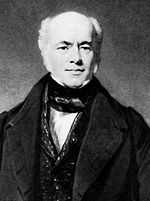Francis Baily
| Francis Baily | |
|---|---|

Royal Astronomical Society portrait
|
|
| Born |
28 April 1774 Newbury, Berkshire, England |
| Died | 30 August 1844 (aged 70) London, England |
| Citizenship | British |
| Nationality | English |
| Fields | Astronomy |
| Known for |
Baily's beads President of the Royal Astronomical Society |
| Notable awards | Gold Medal of the Royal Astronomical Society (1827 & 1843) |
Francis Baily (28 April 1774 – 30 August 1844) was an English astronomer. He is most famous for his observations of 'Baily's beads' during an eclipse of the Sun. Baily was also a major figure in the early history of the Royal Astronomical Society, as one of the founders and president four times.
Baily was born at Newbury in Berkshire in 1774 to Richard Baily. After a tour in the unsettled parts of North America in 1796–1797, his journal of which was edited by Augustus de Morgan in 1856, Baily entered the in 1799. The successive publication of Tables for the Purchasing and Renewing of Leases (1802), of The Doctrine of Interest and Annuities (1808), and The Doctrine of Life-Annuities and Assurances (1810), earned him a high reputation as a writer on life-contingencies; he amassed a fortune through diligence and integrity and retired from business in 1825, to devote himself wholly to astronomy.
By 1820, Baily had already taken a leading part in the foundation of the Royal Astronomical Society, and he received its Gold Medal in 1827 for his preparation of the Society's Catalogue of 2881 stars (Memoirs R. Astr. Soc. ii.). Later, in 1843, he would win the Gold Medal again. He was elected as President of the Royal Astronomical Society four times, with two-year terms each (1825–27, 1833–35, 1837–39 and 1843–45). No other person has served in the position more than Baily's four times (a record he shares with George Airy), whilst his eight years in the post are a record.
The reform of the Nautical Almanac in 1829 was set on foot by his protests. He was elected a Foreign Honorary Member of the American Academy of Arts and Sciences in 1832. He recommended to the British Association in 1837, and in great part executed, the reduction of Joseph de Lalande's and Nicolas de Lacaille's catalogues containing about 57,000 stars; he superintended the compilation of the British Association's Catalogue of 8377 stars (published 1845); and revised the catalogues of Tobias Mayer, Ptolemy, Ulugh Beg, Tycho Brahe, Edmund Halley and Hevelius (Memoirs R. Astr. Soc. iv, xiii.).
...
Wikipedia
